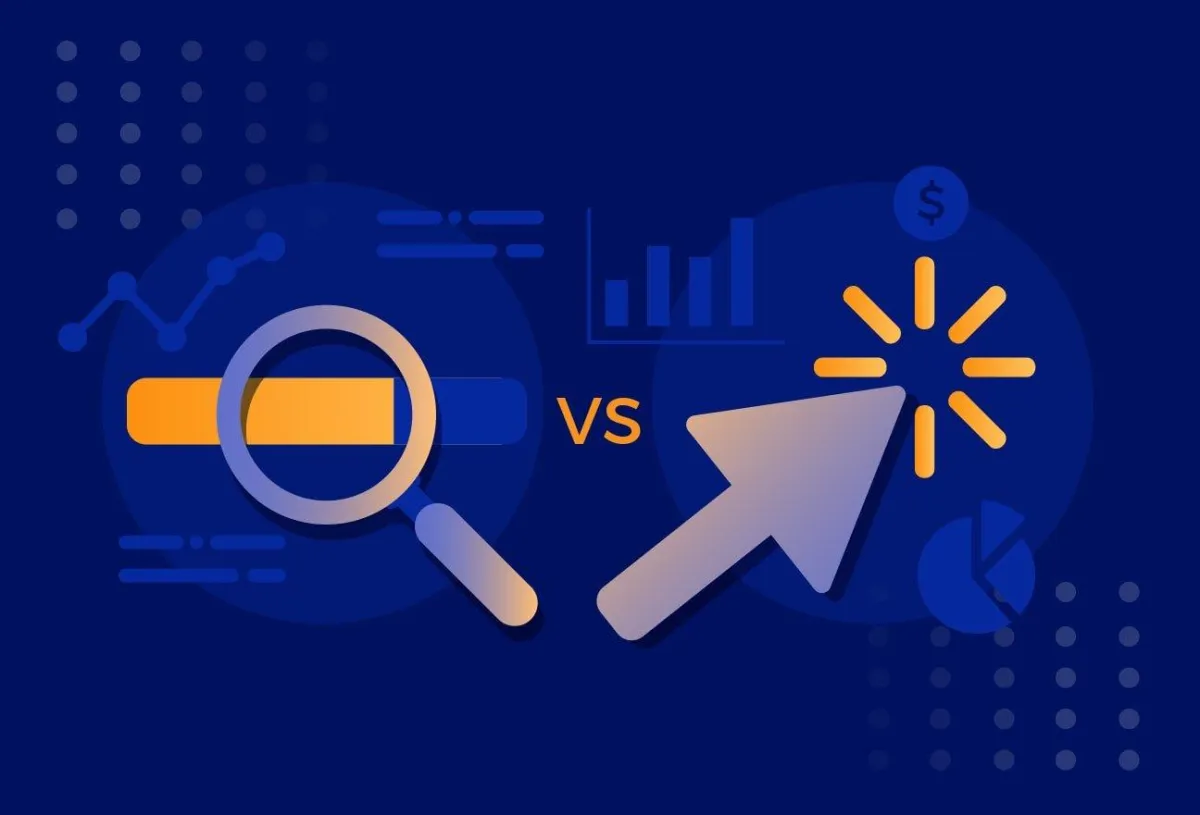
PPC vs. SEO: Which One Is Right for Your Business?
PPC vs. SEO: Which One Is Right for Your Business?
Before we get in to which one is better suited for your business, we should define both of these digital marketing strategies so that we have a good idea of what they mean.
What is PPC?
PPC (or Pay Per Click) advertising is right in the name. It consists of running an advertising campaign on a search engine or social media like google or Facebook, in which you pay to advertise your website to appear at the top of the page for certain specific searches. Every time a user clicks on your ad, you pay a fee. PPC Ads are most commonly run on Google ads, but can be implemented on many different social media and search platforms. How high your ad appears on search pages is dictated by the competition you have from other sites competing for the same key search words, and the size of the area that you are trying to appear for.
What is SEO?
SEO, or search engine optimization, is the process of improving your website’s visibility on search engines like Google. By optimizing your website for search, you aim to appear higher in the organic (non-paid) search results. The goal is to drive traffic to your site over time by creating relevant, high-quality content and optimizing technical aspects of your site. You can do this by changing the content on your website to include key words that your target audience would search for, as well as making high quality content that is useful and helpful for people. One example of this is blog posts (you caught me). The reason these work is because it delivers people with information and answers to common questions that they have, therefore making Google rank your website and content as better than others.
Now lets go over some of the pros and cons of each advertising method.
Benefits of PPC
Immediate Results: Once your PPC campaign is live, your ads can appear almost immediately. This can be invaluable if you need to drive traffic or generate leads quickly.
Targeted Audience: PPC allows you to target specific demographics, locations, and interests. This means you can tailor your ads to your ideal audience and improve the chances of conversion.
Measurable ROI: PPC provides clear, measurable data, allowing you to track impressions, clicks, conversions, and your return on investment (ROI).
Control Over Budget: You have full control over how much you spend on PPC campaigns, making it easy to scale up or down based on performance.
Benefits of SEO
Long-Term Results: SEO takes time to yield results sometimes a lot of time, but once you achieve high rankings, you can enjoy long-term, consistent traffic without having to pay for each click.
Credibility and Trust: Organic search results tend to be viewed as more trustworthy by users. Appearing high in these results can boost your brand’s credibility.
Cost-Effective: Although SEO requires an investment in terms of time and effort, you don’t have to pay for clicks. This makes it a more cost-effective long-term strategy compared to PPC.
Competitive Advantage: Outranking your competitors in organic search can give you a significant competitive edge, especially in your local market or niche.
Drawbacks of PPC
Costly in the Long Term: While PPC can generate quick results, it can become expensive over time, especially in competitive industries where the cost-per-click (CPC) is high.
Requires Constant Management: To get the best results, PPC campaigns require continuous monitoring and optimization. Poorly managed campaigns can result in wasted ad spend.
Less Credibility: Many users recognize the difference between paid and organic search results and may trust organic listings more than paid ones.
Drawbacks of SEO
Takes Time: SEO is a long game, and it can take months to see results. If you need immediate traffic, SEO may not be the best short-term strategy.
Ongoing Effort: To maintain and improve rankings, you need to regularly update your content and stay on top of algorithm changes.
Here's a table that highlights the differences between the two.

Which one is right for you?
Now to the most important part, deciding which method is best for your business and goals.
Now I'll get it out of the way that if you have the budget and time and resources for both methods, that is the best option, however, for most businesses, that's not the case and if you have to choose one, here's what we at Digitrend would recommend.
If your business is looking for some immediate attention and customers for your business, and just need to get the wheels turning and money/orders coming in, then PPC is the way to go. You only pay for every click that you get, which means guaranteed attention, although not guaranteed sales. PPC with a good ad campaign will get things flowing quickly as you start to build other things out and grow.
If your business already has a steady stream of customers, and you don't have to worry about short term results as much, then SEO is the way to go. SEO, although it takes time, brings in more, high quality customers to your business. It makes your business look more trustworthy and legit, and is one of if not the best long term marketing growth strategies for online businesses or physical businesses with an online presence or website.
Now like we said before, many businesses start both methods at the same time. They use PPC to get immediate results while they get hard to work on their SEO since it takes a while to get good high quality tangible results.
P.S
If you've read this article and still don't know where to go from here or how to start, send us an email at [email protected] and we'll help you get your campaigns up and running!
